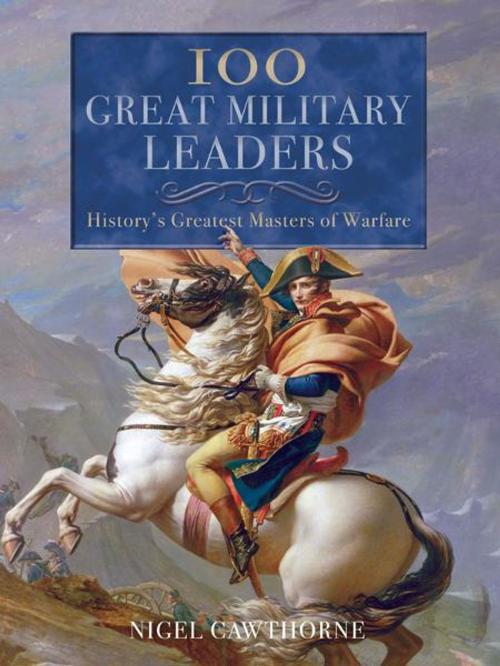100 Great Military Leaders
History's Greatest Masters of Warfare
Nonfiction, History, Military, Strategy| Author: | Nigel Cawthorne | ISBN: | 9781848588745 |
| Publisher: | Arcturus Publishing | Publication: | April 14, 2012 |
| Imprint: | Arcturus | Language: | English |
| Author: | Nigel Cawthorne |
| ISBN: | 9781848588745 |
| Publisher: | Arcturus Publishing |
| Publication: | April 14, 2012 |
| Imprint: | Arcturus |
| Language: | English |
Military history as told through the lives and deeds of warfare's most famous commanders, from ancient Greece through the World Wars, Vietnam, and the end of the twentieth century. Beginning with Leonides of Sparta, who died at Thermopylae in 480 b.c.e., and ending with General Giap, a Vietnamese leader; Moshe Dayan, commander of the Israeli Defense Force during the 1967 Six-Day War; and Colin Powell, Military Commanders provides an informative overview of the careers and battles of one hundred military commanders and their places in history. Divided by eras, the material covers the ancient world, the Anglo-Saxons and the Vikings, the Middle Ages, the Napoleonic period, the American War of Independence and the Civil War, the two World Wars, and the postwar conflicts. Each entry provides a chronology of major events as well as a summary of achievements. The entries, both fascinating and easy to read, succeed in providing a clear yet nuanced picture of the role of the individual in historical events. An engaging and thought-provoking book, full of facts, pertinent quotations, and anecdotes, Military Commanders is sure to prove of interest to a wide range of readers. Nigel Cawthorne has a degree from University College, London. He has written, contributed to, and edited more than sixty books including, Fighting Them on the Beaches: D-Day, 6 June 1944; Turning the Tide: Decisive Battles of the Second World War; and The Encyclopedia of World Terrorism. His work has appeared in over one hundred and fifty newspapers and magazines on both sides of the Atlantic.
Military history as told through the lives and deeds of warfare's most famous commanders, from ancient Greece through the World Wars, Vietnam, and the end of the twentieth century. Beginning with Leonides of Sparta, who died at Thermopylae in 480 b.c.e., and ending with General Giap, a Vietnamese leader; Moshe Dayan, commander of the Israeli Defense Force during the 1967 Six-Day War; and Colin Powell, Military Commanders provides an informative overview of the careers and battles of one hundred military commanders and their places in history. Divided by eras, the material covers the ancient world, the Anglo-Saxons and the Vikings, the Middle Ages, the Napoleonic period, the American War of Independence and the Civil War, the two World Wars, and the postwar conflicts. Each entry provides a chronology of major events as well as a summary of achievements. The entries, both fascinating and easy to read, succeed in providing a clear yet nuanced picture of the role of the individual in historical events. An engaging and thought-provoking book, full of facts, pertinent quotations, and anecdotes, Military Commanders is sure to prove of interest to a wide range of readers. Nigel Cawthorne has a degree from University College, London. He has written, contributed to, and edited more than sixty books including, Fighting Them on the Beaches: D-Day, 6 June 1944; Turning the Tide: Decisive Battles of the Second World War; and The Encyclopedia of World Terrorism. His work has appeared in over one hundred and fifty newspapers and magazines on both sides of the Atlantic.















